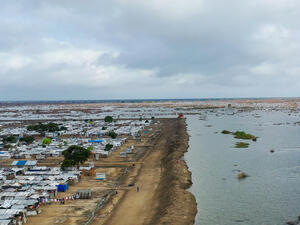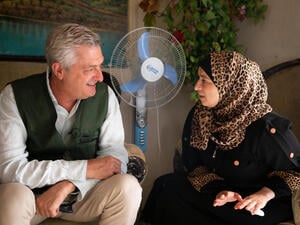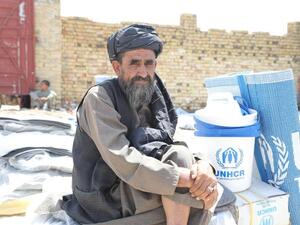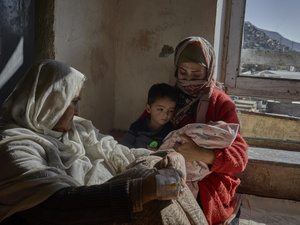Western Saharan refugees face malnutrition, warn aid agencies
Western Saharan refugees face malnutrition, warn aid agencies
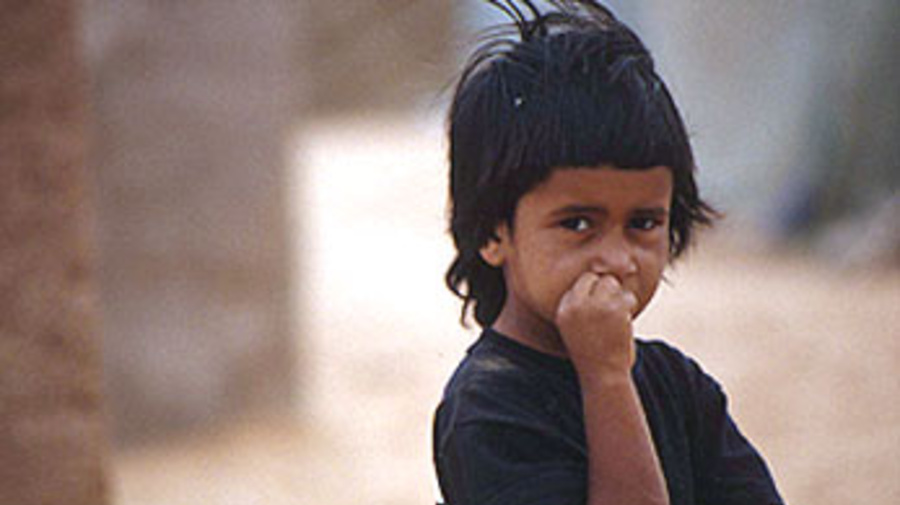
A young Saharawi refugee faces up to the uncertainties at Smara camp in the Tindouf region of Algeria.
GENEVA, August 29 (UNHCR) - The UN refugee agency and World Food Programme (WFP) today made a joint appeal for more food aid and funds for some 155,000 Western Saharan refugees facing malnutrition in camps along Algeria's border with Western Sahara.
The two agencies stressed the urgency of the matter at a briefing in Geneva Thursday to update donors on the protracted refugee situation in Western Sahara.
"Securing an adequate and balanced food pipeline is essential until a global political solution to the Western Sahara issue is found," Ambassador William Swing, Special Representative of the UN Secretary-General, told donor countries gathered at the UN refugee agency's Geneva headquarters. "It shows international commitment to a political solution and enhances UNHCR's protection mandate."
Some 155,000 refugees, who live in four isolated desert camps about 2,000 km south of Algeria's Mediterranean coast near the historic oasis town of Tindouf, survive almost entirely on humanitarian aid provided through WFP. But contributions have dwindled as international interest in the 27-year-old refugee situation and the future of the disputed Western Sahara territory wanes.
"With the lack of international attention to their plight, obtaining regular contributions of food aid for the Western Saharan refugees is extremely difficult," said WFP's Daly Belgasmi, director of the agency's Geneva office.
WFP's relief operation in Algeria has faced food shortages and disruptions in its delivery pipeline for some time now, but if fresh contributions of food do not arrive by October, the refugees will receive only 11 percent of their daily food requirements. Each person will get just 231 kcals daily, compared to the standard UN ration of flour, pulses, beans, vegetable oil and other items totalling 2,100 kcals daily.
"Unless we receive aid soon, the drastic reduction in October's food package will have severe consequences on the health of the refugees, particularly for children under five, pregnant women and lactating mothers," said Belgasmi.
WFP requires 8,336 metric tons of food at a cost of $3.7 million, of which 80 percent are cereals, to meet the refugees' food needs up to January 2003.
The UN refugee agency is also experiencing a cash crunch in its Western Saharan operations. So far, it has received only $1.5 million out of the $4.6 million needed to care for refugees in the troubled region.
"The Western Saharan refugees are really experiencing enormous difficulties," said UNHCR's Radhouane Nouicer, who oversees operations in North Africa and the Middle East. "Thirty-five percent of the children suffer chronic malnutrition, and 13 percent of the children are acutely malnourished, leading to a high level of stunting among young children."
UNHCR and WFP plan to conduct a comprehensive nutritional survey of Algeria's refugee population in September.
The UN's Ambassador Swing believes that continued firm donor support for the refugees' humanitarian needs would help prevent the issue from falling out of sight.
"Donor support for the Saharawis food programme keeps everyone focused on the essentials - both the larger political question as well as sub-issues like confidence-building measures and accounting for prisoners of war and persons unaccounted for from the conflict," Swing said.
The refugees in question are local Saharawi people who fled Western Sahara for Algeria from 1975 when Morocco annexed the mineral-rich desert region after Spain abandoned it. A 15-year war ensued between the Moroccan government and the Polisario Front. The UN managed to negotiate a cease-fire agreement in 1991, but has so far been unable to decide the political future of the disputed territory.



